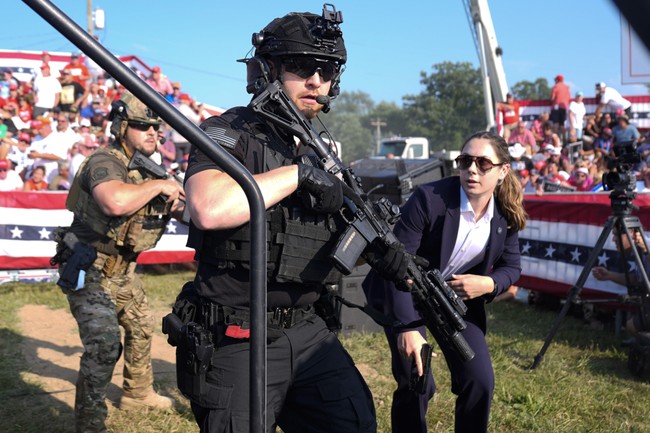
In the wake of Saturday’s failed assassination attempt on former President Donald Trump, the US Secret Service is still unable to explain how the incident happened, but it is devoting a lot of effort to defending the Secret Service agents who appeared to be flummoxed and a lot less than competent as former President Trump was evacuated to the hospital.
RELATED:
Mayorkas Throws Trump Security Detail Under the Bus With Claim That Trump Had ‘Enhanced Security’
About Those Female Secret Service Agents Protecting Trump
Anthony Guglielmi, the Secret Service’s chief of communication, said in the statement: “We stand united against any attempt to discredit our personnel and their invaluable contributions to our mission and are appalled by the disparaging and disgusting comments against any of our personnel.”
“As an elite law enforcement agency, all of our agents and officers are highly trained and fully capable of performing our missions,” he said.
“It is an insult to the women of our agency to imply that they are unqualified based on gender. Such baseless assertions undermine the professionalism, dedication and expertise of our workforce,” he added.
Except, that is not the case. Under the current director, the Secret Service has relentlessly pursued a goal of ensuring that 30% of protective detail agents are women.
The physical fitness standards required are wildly different — a male doing four pull-ups fails the fitness test fails, a woman doing four pull-ups gets a max score. The physical fitness requirements are either related to the job or they are not; in that case, they would have difficulty surviving a legal challenge. If they are related to the job and men and women are required to do the same job, they must be the same. There are other stories circulated, which I cannot confirm, of women getting a pass on firearms handling. The woman who had a couple of close calls in trying to find her holster seems to validate that.
The problem with DEI is that it dictates decisions based not on performance or on the old virtues, such as honor, but on demographics and ideology. Failure is easily dismissed and blame easily shifted.
Another problem: DEI is hard to roll back. Will the Secret Service jettison its goal of increasing the number of female recruits? Will it reassign the women on the president’s security detail? Will the agency ditch the separate fitness standards and require that women prove as capable as men?
No. There might be symbolic resignations or slight tightening of the standards, but the DEI regime, in force for a half-century, can’t be abandoned without a public fight.
This is where Trump could make a difference. If he is elected president again, he has a chance to rescind affirmative action, reject critical race and gender ideologies, and abolish all DEI programs in the federal government. This would not only improve the performance of the Secret Service but also the functioning of government as a whole.
Neither a president’s life nor a country’s should be gambled on DEI.
While the Secret Service is trying to make this a sex issue, it isn’t. It is a competence issue. There is no issue with women on a presidential protective detail so long as the men and women meet the same objective, empirical standards. In the words of Inspector Harry Callahan in The Enforcer:
Christopher Rufo, who is probably the most dogged critic of the DEI Industrial Complex on social media, notes that the very fact they are accepting DEI as a synonym for failure and incompetence shows we are winning.
